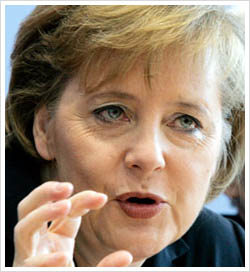Unruffled Merkel stays above the election fray
 Berlin - German Chancellor Angela Merkel, of the Christian Democrats (CDU), at times seems impervious to the fact that an election campaign is going on around her.
Berlin - German Chancellor Angela Merkel, of the Christian Democrats (CDU), at times seems impervious to the fact that an election campaign is going on around her.
Brushing aside criticisms from political opponents and even demands within her own party to infuse energy into a lacklustre election campaign, Merkel has retained her presidential calm at the helm of Europe's most populous country and largest economy.
"Volume and insulting other people should not be the measure by which the seriousness of the election campaign should be judged," Merkel told German Press Agency dpa, swatting away the criticisms.
The chancellor's popularity - which far outstrips that of her party - has remained undented by state elections this month in which the CDU suffered serious setbacks.
In a poll conducted by ARD television 57 per cent said they would elect Merkel directly if they could, while only 28 per cent said they would pick Steinmeier.
The CDU stands to gain 35-37 per cent of the September 27 vote, compared to around 23 per cent for the Social Democrats (SPD) according to recent polls.
Merkel's CDU hopes the election will return a sufficient majority to ditch the so-called grand coalition with the SPD, in favour of a new pro-market partnership with the Free Democrats (FDP).
Unostentatious in her sensible trouser suits and no-nonsense fringe, the chancellor's popularity stems from her quiet determination to get on with the job.
"This humble appearance, and the fact that she doesn't stage things, that is her actual staging," said Gerd Langguth, a political scientist and biographer of Merkel.
At the same time, Langguth says Merkel's upbringing under a totalitarian East German regime may have taught her to mask her true thoughts.
"Maybe this is why Merkel is so closed," Langguth told German Press Agency dpa. "In East Germany she learned for a long time never to show her own opinion."
Merkel has tried to reveal her personal side, proclaiming a love of the Beatles and Rolling Stones, and telling a German women's magazine that she writes the shopping list for her media-shy husband, quantum chemist Joachim Sauer.
The daughter of a protestant priest, Merkel was born near Hamburg in 1954, and moved to East Germany with her family at a time when people were fleeing in the opposite direction.
A trained physicist, Merkel did not enter politics until the age of 35, after the fall of the Berlin Wall. Within the CDU she quickly came to the attention of then-chancellor Helmut Kohl.
The remarried, childless protestant from former East Germany stood out in the CDU's conservative, Catholic image of a party dominated by men and firmly rooted in Germany's west.
Nevertheless, "Kohl's girl" first became minister for women and youth, then inherited the environment brief. In 2000 she was elected as the first female leader of the CDU.
While Merkel learned her political skills under Kohl, she does not share his sense of historical imperative, Langguth said.
"She is a non-ideological, pragmatic problem solver," Langguth said, adding that pathos was not Merkel's style.
What many see as Merkel's pragmatism can also be considered opportunist. Voted in on a tax-cutting agenda in 2005, Merkel quickly adapted to the limitations of a grand coalition.
Merkel's ambitious health reform programme became a messy compromise. But the more concrete decisions of her government include a value-added tax increase, and raising the retirement age to 67.
Internationally, Merkel has gained respect, first capitalizing on the 2006 Football World Cup held in Germany, then showing leadership during the country's rotating presidency of the Group of Eight (G8).
More recently, the chancellor stood her ground during thefinancial crisis, rebuffing initial calls from the US and Japan for government bailouts to boost the German economy.
Now the apparent rescue of German carmaker Opel, and two successive quarters of economic growth, allow Merkel to argue that her government has fended off the worst of the economic crisis.
The chancellor's demands for a tightening of international financial markets and her proposed 'charter of sustainable growth' should further place her in a lead role at the G20 summit in Pittsburgh, US, just days before the German election.
Indeed, the economy forms the lynchpin of Merkel's election pledges, arguing that the need to encourage growth in the wake of the economic crisis aligns the CDU with the FDP's liberal agenda.
"We have the strength," proclaim the CDU's election posters, above a flattering picture of Merkel with a maternal smile.
But while the CDU is relying on the popularity of its leader to =bring in the vote, Merkel is also likely to carry the can if her hands-off approach to the election campaign fails to pay off.
In 2005, against the more energetic campaigner Gerhard Schroeder, Merkel allowed a healthy poll lead to slip to almost a dead heat in the final days of the campaign - could it happen again? (dpa)